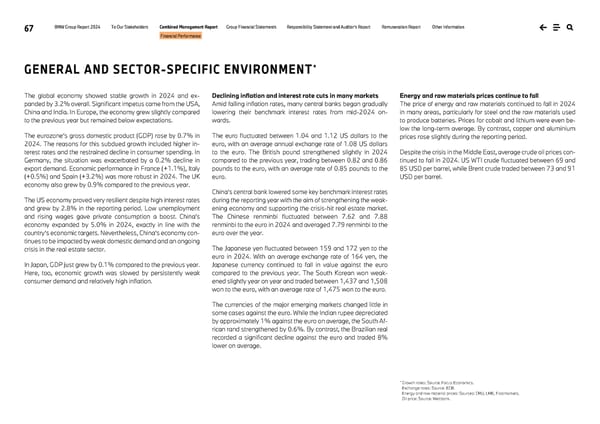67 BMW Group Report 2024 To Our Stakeholders Combined Management Report Group Financial Statements Responsibility Statement and Auditor’s Report Remuneration Report Other Information Financial Performance GENERAL AND SECTOR-SPECIFIC ENVIRONMENT * The global economy showed stable growth in 2024 and ex- panded by 3.2% overall. Significant impetus came from the USA, China and India. In Europe, the economy grew slightly compared to the previous year but remained below expectations. The eurozone’s gross domestic product (GDP) rose by 0.7% in 2024. The reasons for this subdued growth included higher in- terest rates and the restrained decline in consumer spending. In Germany, the situation was exacerbated by a 0.2% decline in export demand. Economic performance in France (+1.1%), Italy (+0.5%) and Spain (+3.2%) was more robust in 2024. The UK economy also grew by 0.9% compared to the previous year. The US economy proved very resilient despite high interest rates and grew by 2.8% in the reporting period. Low unemployment and rising wages gave private consumption a boost. China’s economy expanded by 5.0% in 2024, exactly in line with the country’s economic targets. Nevertheless, China’s economy con- tinues to be impacted by weak domestic demand and an ongoing crisis in the real estate sector. In Japan, GDP just grew by 0.1% compared to the previous year. Here, too, economic growth was slowed by persistently weak consumer demand and relatively high inflation. Declining inflation and interest rate cuts in many markets Amid falling inflation rates, many central banks began gradually lowering their benchmark interest rates from mid-2024 on- wards. The euro fluctuated between 1.04 and 1.12 US dollars to the euro, with an average annual exchange rate of 1.08 US dollars to the euro. The British pound strengthened slightly in 2024 compared to the previous year, trading between 0.82 and 0.86 pounds to the euro, with an average rate of 0.85 pounds to the euro. China’s central bank lowered some key benchmark interest rates during the reporting year with the aim of strengthening the weak- ening economy and supporting the crisis-hit real estate market. The Chinese renminbi fluctuated between 7.62 and 7.88 renminbi to the euro in 2024 and averaged 7.79 renminbi to the euro over the year. The Japanese yen fluctuated between 159 and 172 yen to the euro in 2024. With an average exchange rate of 164 yen, the Japanese currency continued to fall in value against the euro compared to the previous year. The South Korean won weak- ened slightly year on year and traded between 1,437 and 1,508 won to the euro, with an average rate of 1,475 won to the euro. The currencies of the major emerging markets changed little in some cases against the euro. While the Indian rupee depreciated by approximately 1% against the euro on average, the South Af- rican rand strengthened by 0.6%. By contrast, the Brazilian real recorded a significant decline against the euro and traded 8% lower on average. Energy and raw materials prices continue to fall The price of energy and raw materials continued to fall in 2024 in many areas, particularly for steel and the raw materials used to produce batteries. Prices for cobalt and lithium were even be- low the long-term average. By contrast, copper and aluminium prices rose slightly during the reporting period. Despite the crisis in the Middle East, average crude oil prices con- tinued to fall in 2024. US WTI crude fluctuated between 69 and 85 USD per barrel, while Brent crude traded between 73 and 91 USD per barrel. * Growth rates: Source: Focus Economics. Exchange rates: Source: ECB. Energy and raw material prices: Sources: CRU, LME, Fastmarkets. Oil price: Source: Weltbank.
 BMW Group Report 2024 Page 66 Page 68
BMW Group Report 2024 Page 66 Page 68